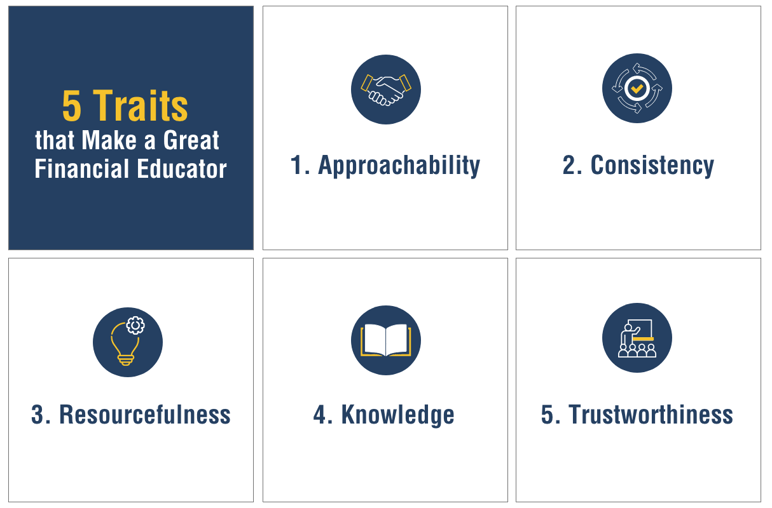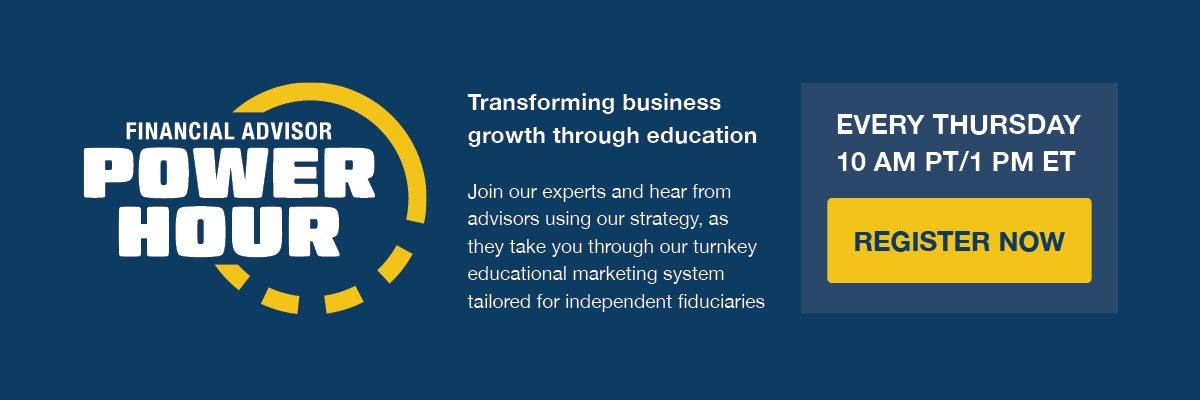You may have heard about the benefit of educational marketing for financial advisors, but aren’t sure where to start. You’re not alone! The truth is that many of today’s advisors already believe they’re incorporating education into their businesses, but fail to recognize the traits that truly set an education-first approach apart.
It’s one thing to engage in standard “educational marketing” practices such as dinner seminars and one-time virtual workshops. It’s entirely another to teach comprehensive retirement education courses to qualified adult investors at educational venues. When you truly embrace education as the foundation of your business, you can completely transform your client acquisition process.
If you can harness this power, you will acquire more of your clients’ business faster and retain them for life. An education-first approach to growing your business starts in the classroom as a knowledgeable resource and guide that attendees trust to teach them about their financial lives — and not to make a sales pitch. The relationships nurtured in class will bear fruit as attendees reach out for additional guidance.
So how do you know if teaching retirement education courses is the right lead-generation approach for you? Display these five traits in the classroom (and beyond), and you’ll give client acquisition an entirely new look.

1. Approachability
An approachable attitude in and out of the classroom is a powerful tool for fostering and maintaining client relationships. You might consider having an “open door” policy that enables — and encourages — course attendees or clients to frequently engage with you, asking questions that will quiet their financial anxieties, exactly when and where they arise.
It’s important to be comfortable providing prospects and clients with helpful information wherever possible. Try leveraging a variety of channels (website, social media, newsletters, email, phone, in-person) to share info and help clients access it in a way that best suits their needs. Also, focus on using a welcoming and accommodating approach to each interaction.
2. Consistency
Strive to always be consistent in the way you communicate with prospects and clients. Long-term success is about building a relationship, and that relationship needs a consistent, steadfast foundation to last through ups and downs. A focus on consistency and dependability will build enduring relationships that can carry your business forward through times of industry turbulence.
Keep in mind that it takes time and effort to build a successful business model with an educational approach to marketing (another area that demands consistency). Willingness to “put in the work” with your educational marketing model will go a long way. In time, the seeds you plant with prospects in the classroom will grow into long-lasting client relationships.
3. Resourcefulness
A great financial educator must be willing to evolve and grow along with the industry. This can be easier if you’ve nurtured partnerships with other industry experts — or even considered co-teaching a financial education course together!
Keep an eye on the leading resources and industry blogs for financial educators to stay up to date with the latest tools and advancements. If you can find ways to bring these insights into the classroom, you will not only benefit your attendees but provide convincing evidence of your up-to-date expertise.
4. Knowledge
This is likely to be the easiest box for you to check as a practicing financial advisor. Having a strong sense of practical industry knowledge and being a subject matter expert will serve you well in the classroom as a financial educator. The prospective clients who attend your classes are looking to you as a thought leader. Be confident when sharing your expert knowledge with your community.
It’s not uncommon for both newer and seasoned advisors to wonder if they’ll have enough “classroom presence” to convey their knowledge with confidence. Rest assured, FINRA-approved course materials and speaking notes from a quality financial education course can supplement your innate knowledge and provide the structure you need to demonstrate to attendees that you’re a knowledgeable resource.
5. Trustworthiness
One of the biggest obstacles in financial services is trust (consider: only 12% of people say they trust accountants). Great financial educators are dedicated to fostering financial education throughout their immediate community. Uphold yourself as the community educator that you are — this is not a one-and-done type of deal. Don’t be afraid to engage with people in a real and sincere way. Sharing personal stories or examples (while protecting any identifying or private client information) is a great way to personalize and humanize a course, which promotes trust.
Also, keep in mind that finances can be very emotional for people to talk about. Try to cultivate an aura of understanding and active listening when course attendees or clients share personal questions, worries, or challenges. It can help to restate what you’re hearing at the beginning of your response to show that you’re engaged and make sure you’re clearly understanding and addressing their concern.
Interested in learning more about what it takes to be a great financial educator? Follow our regularly updated blog about educational marketing for financial advisors — or reach out to FMT to learn more about our financial education programs today.
